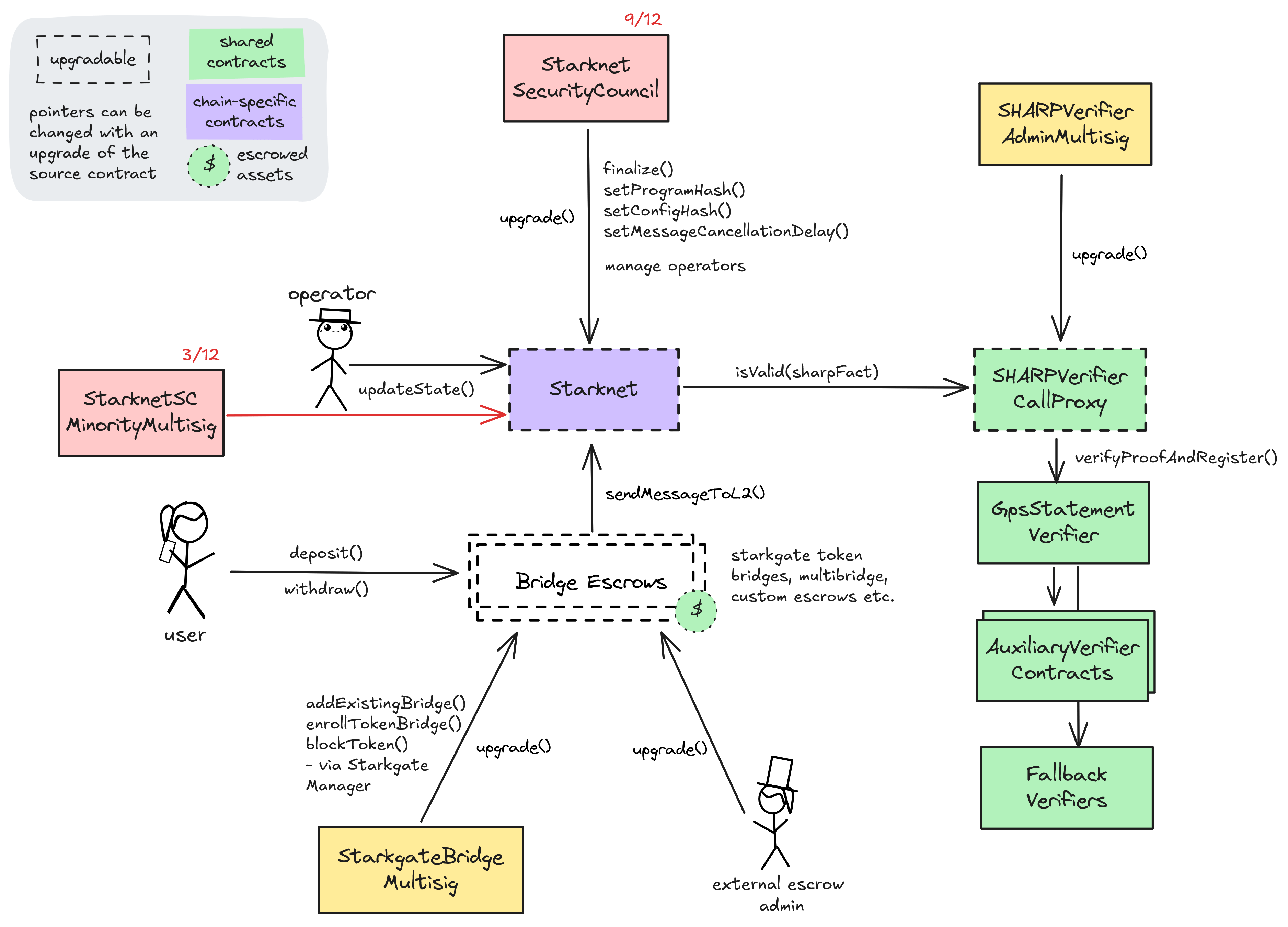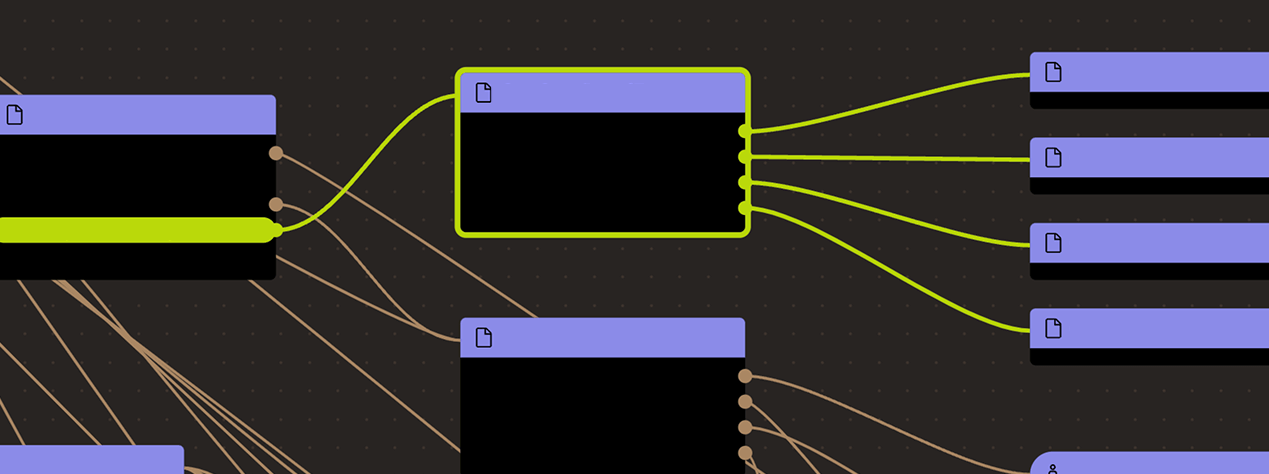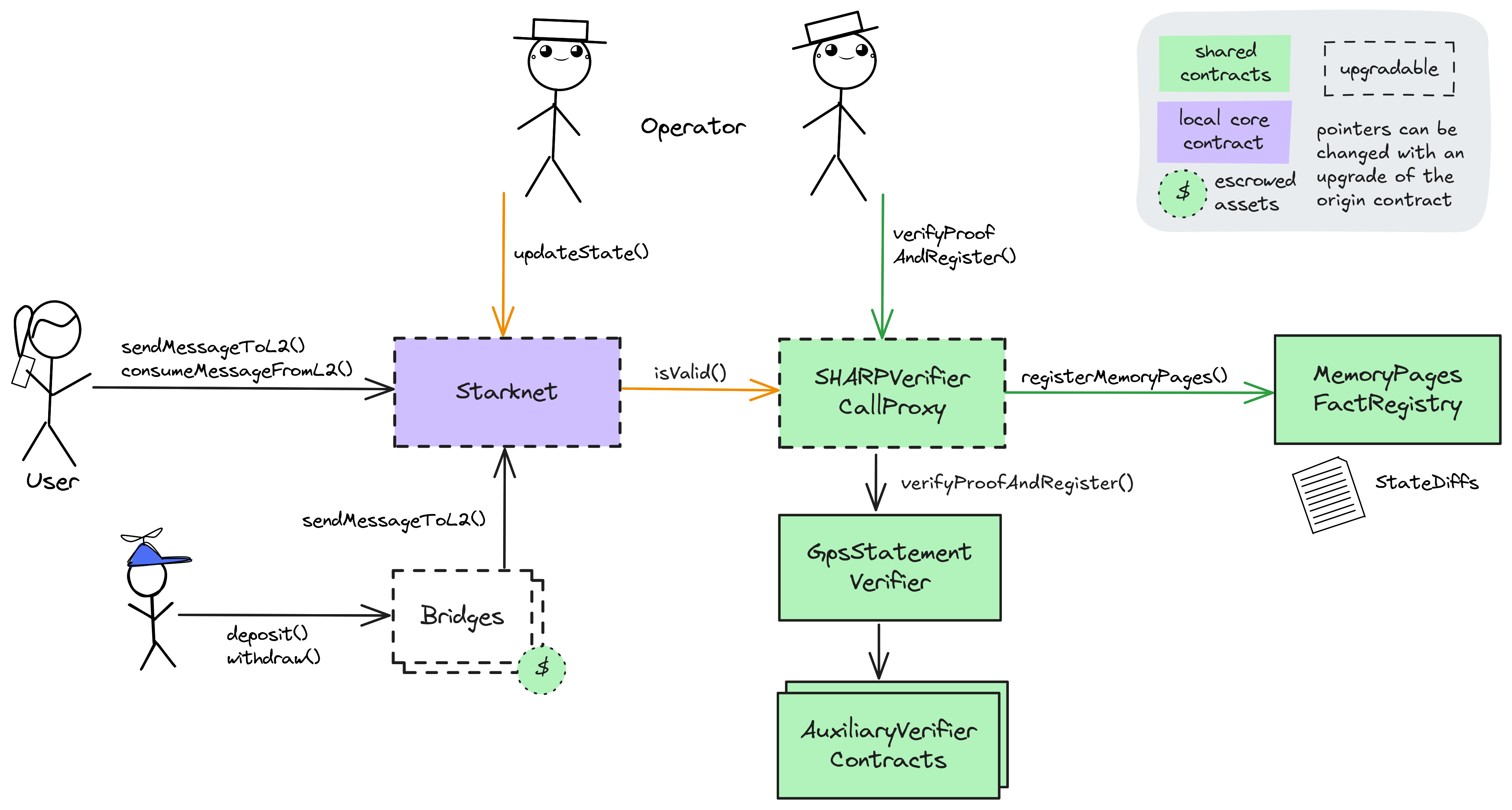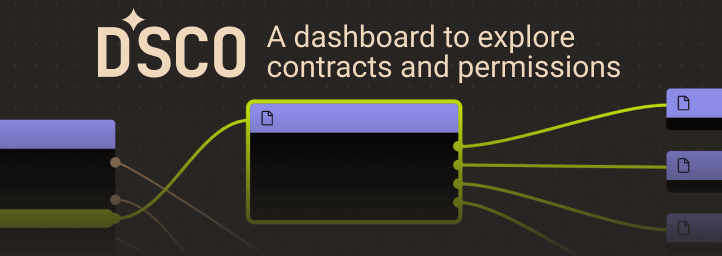Search
Search for projects by name or address
 Starknet
Starknet
Badges
About
Starknet is a ZK rollup that uses STARK proofs to securely scale Ethereum and Ethereum blobs for data availability. Starknet is also actively engaged in bringing Bitcoin users the same scale, UX, and liquidity through a variety of products and programs.
Badges
About
Starknet is a ZK rollup that uses STARK proofs to securely scale Ethereum and Ethereum blobs for data availability. Starknet is also actively engaged in bringing Bitcoin users the same scale, UX, and liquidity through a variety of products and programs.
2025 Feb 14 — 2026 Feb 14
The section shows the operating costs that L2s pay to Ethereum.
2025 Feb 15 — 2026 Feb 14
This section shows how much data the project publishes to its data-availability (DA) layer over time. The project currently posts data to![]() Ethereum.
Ethereum.
2025 Feb 15 — 2026 Feb 14
This section shows how "live" the project's operators are by displaying how frequently they submit transactions of the selected type. It also highlights anomalies - significant deviations from their typical schedule.
Starknet reverts 18mins of history
2026 Jan 5th
Starknet experienced an outage during which block production was halted.
Funds can be stolen if
Funds can be frozen if
Users can be censored if
MEV can be extracted if
Users can submit transactions to an L1 map, but can’t force them. When users “complain” that their transaction is stuck on L1 and not picked up by the sequencer, the Security Council minority can bypass the sequencer by posting a state root that includes it.
STARKs are zero knowledge proofs that ensure state correctness.
All of the data (SD = state diffs) needed for proof construction is published onchain.
Standard upgrades are initiated on L1 and go through a 8d delay. In case users are censored, the Security Council minority can be alerted to enforce censorship resistance by submitting a new state root. This process is assumed to take 1d.
Only the whitelisted proposer can update state roots on L1, so in the event of failure the withdrawals are frozen. The Security Council minority can be alerted to enforce censorship resistance because they are a permissioned Operator.
All data required to reconstruct rollup state is published on chain
State diffs are publish onchain as blob or calldata on every state update. The state diffs contain information on every contact whose storage was updated, and additional information on contract deployments. From diffs full system state can be recovered. Contracts’ code is not published on L1, but can be trustlessly verified if available elsewhere.
Starknet uses stateful compression since v0.13.4.
There is no non-empty genesis state.
The data format has been updated with different versions, and the full specification can be found here.
Each update to the system state must be accompanied by a ZK proof that ensures that the new state was derived by correctly applying a series of valid user transactions to the previous state. These proofs are then verified on Ethereum by a smart contract.
Each update to the system state must be accompanied by a ZK proof that ensures that the new state was derived by correctly applying a series of valid user transactions to the previous state. These proofs are then verified on Ethereum by a smart contract.
Program Hashes
Name | Hash | Repository | Verification | Used in | |||||||||||||||||||||||||||||||||||||||||||||||||||||||||||||||||||||||||||||||||||||||||||||||
|---|---|---|---|---|---|---|---|---|---|---|---|---|---|---|---|---|---|---|---|---|---|---|---|---|---|---|---|---|---|---|---|---|---|---|---|---|---|---|---|---|---|---|---|---|---|---|---|---|---|---|---|---|---|---|---|---|---|---|---|---|---|---|---|---|---|---|---|---|---|---|---|---|---|---|---|---|---|---|---|---|---|---|---|---|---|---|---|---|---|---|---|---|---|---|---|---|---|---|---|
918745...5685 | |||||||||||||||||||||||||||||||||||||||||||||||||||||||||||||||||||||||||||||||||||||||||||||||||||
170102...5867 | |||||||||||||||||||||||||||||||||||||||||||||||||||||||||||||||||||||||||||||||||||||||||||||||||||
378893...4778 | |||||||||||||||||||||||||||||||||||||||||||||||||||||||||||||||||||||||||||||||||||||||||||||||||||
989994...0176 | |||||||||||||||||||||||||||||||||||||||||||||||||||||||||||||||||||||||||||||||||||||||||||||||||||
348018...5714 | Code unknown | None | |||||||||||||||||||||||||||||||||||||||||||||||||||||||||||||||||||||||||||||||||||||||||||||||||
303597...6711 | Code unknown | None | |||||||||||||||||||||||||||||||||||||||||||||||||||||||||||||||||||||||||||||||||||||||||||||||||
358503...1237 | Code unknown | None | |||||||||||||||||||||||||||||||||||||||||||||||||||||||||||||||||||||||||||||||||||||||||||||||||
160268...8631 | |||||||||||||||||||||||||||||||||||||||||||||||||||||||||||||||||||||||||||||||||||||||||||||||||||
110431...7907 | |||||||||||||||||||||||||||||||||||||||||||||||||||||||||||||||||||||||||||||||||||||||||||||||||||

The Starknet zk Rollup shares its SHARP verifier with other StarkEx and SN Stack Layer 2s. Governance of the main Starknet rollup contract and its core bridge escrows (ETHBridge, STRKBridge) is currently split between the 9/12 Security Council with instant upgrade capability and the 2/4 Starkware Multisig 2 who can upgrade with a 8d delay. The former Multisig also governs most other bridge escrows with instant upgradeability. The shared SHARP verifier used for state validation can be changed by the 2/4 SHARP Multisig with and a 8d delay, affecting all rollups like Starknet that are sharing it.
The Operator role in the Starknet contract is permissioned to update the state of the Starknet rollup by supplying valid (zk) state transition proofs. Since this role is not permissionless, Starknet implements a StarknetSCMinorityMultisig with the Operator role, which allows a 3/12 minority of the StarknetSecurityCouncil to enforce censorship resistance by including transactions that are not included by regular Operators.
All bridge escrows allow enabling a withdrawal throttle of 5% of the locked funds per 24h period. Enabling it is permissioned to a Multisig while disabling it in the core bridge escrows (STRKBridge, ETHBridge) can be done by a 3/12 minority of the Security Council.
The system has a centralized operator
MEV can be extracted if the operator exploits their centralized position and frontruns user transactions.
Users can't force any transaction
There is no general mechanism to force the sequencer to include the transaction.
Users can be censored if the operator refuses to include their transactions.
Emergency exit
There is no generic escape hatch mechanism as Starknet cannot be forced by users into a frozen state. Note that a freezing mechanism on L2, to be secure, requires anti-censorship protection.

Ethereum
Roles:
Permissioned to regularly update the state of the L2 on L1. Each state update must have been proven via the SHARP verifier and contains state diffs for data availability.
Permissioned to manage the Operator role, finalize state and change critical parameters like the programHash, configHash, or message cancellation delay in the core contract.
- Starkware Multisig 1 has the role with 8d delay
Actors:
A Multisig with 2/4 threshold.
- Can upgrade with no delay
- StarkgateManager
- StarkgateRegistry
- WBTCBridge
- FXSBridge
- sfrxETHBridge
- FRAXBridge
- MultiBridge
- UNIBridge
- Can upgrade with 3d delay
- USDTBridge - acting directly with 3d delay
- wstETHBridge - acting directly with 3d delay
- rETHBridge - acting directly with 3d delay
- USDCBridge - acting directly with 3d delay
- Can interact with StarkgateManager
- enroll new tokens, deactivate existing ones (for deposits) or block tokens from being added to the Multibridge
- manage critical access control roles related to upgrades and set the proxy governor that can upgrade the implementation
- Can interact with StarkgateRegistry
- manage critical access control roles and the role that can upgrade the implementation
- Can interact with WBTCBridge
- disable the withdrawal limit and manage the security agent role that can enable it
- manage critical access control roles related to upgrades and set the proxy governor that can upgrade the implementation
- Can interact with FXSBridge
- disable the withdrawal limit and manage the security agent role that can enable it
- manage critical access control roles related to upgrades and set the proxy governor that can upgrade the implementation
- Can interact with USDTBridge
- disable the withdrawal limit and manage the security agent role that can enable it
- manage critical access control roles related to upgrades and set the proxy governor that can upgrade the implementation
- Can interact with wstETHBridge
- disable the withdrawal limit and manage the security agent role that can enable it
- manage critical access control roles related to upgrades and set the proxy governor that can upgrade the implementation
- Can interact with rETHBridge
- disable the withdrawal limit and manage the security agent role that can enable it
- manage critical access control roles related to upgrades and set the proxy governor that can upgrade the implementation
- Can interact with sfrxETHBridge
- disable the withdrawal limit and manage the security agent role that can enable it
- manage critical access control roles related to upgrades and set the proxy governor that can upgrade the implementation
- Can interact with FRAXBridge
- disable the withdrawal limit and manage the security agent role that can enable it
- manage critical access control roles related to upgrades and set the proxy governor that can upgrade the implementation
- Can interact with LUSDBridge
- disable the withdrawal limit and manage the security agent role that can enable it
- manage critical access control roles related to upgrades and set the proxy governor that can upgrade the implementation
- Can interact with MultiBridge
- disable the withdrawal limit and manage the security agent role that can enable it
- manage critical access control roles related to upgrades and set the proxy governor that can upgrade the implementation
- Can interact with USDCBridge
- disable the withdrawal limit and manage the security agent role that can enable it
- manage critical access control roles related to upgrades and set the proxy governor that can upgrade the implementation
- Can interact with UNIBridge
- disable the withdrawal limit and manage the security agent role that can enable it
- manage critical access control roles related to upgrades and set the proxy governor that can upgrade the implementation
A Multisig with 9/12 threshold.
- Can upgrade with no delay
- ETHBridge
- Starknet
- STRKBridge
- Can interact with ETHBridge
- manage critical access control roles related to upgrades and set the proxy governor that can upgrade the implementation
- Can interact with STRKBridge
- manage critical access control roles related to upgrades and set the proxy governor that can upgrade the implementation
- A Governor - acting directly
A Multisig with 2/6 threshold.
- Can upgrade with 8d delay
- ETHBridge DelayedExecutor with 8d delay
- Starknet DelayedExecutor with 8d delay
- STRKBridge DelayedExecutor with 8d delay
- A Governor DelayedExecutor with 8d delay
A Multisig with 2/4 threshold.
- Can upgrade with 8d delay
- SHARPVerifierCallProxy - acting directly with 8d delay
- Can interact with SHARPVerifierCallProxy
- manage the upgrade admin amd access control roles
- set custom implementations for specific operators (changes the verifier based on who calls it)
A Multisig with 3/12 threshold.
- Can interact with ETHBridge
- disable the withdrawal limit and manage the security agent role that can enable it
- Can interact with STRKBridge
- disable the withdrawal limit and manage the security agent role that can enable it
- An Operator - acting directly
Acts as a central contract to manage StarkGate bridge escrows (add new ones, deactivate existing, change configs) when given the Manager role from the respective escrows.
- Can interact with MultiBridge
- enroll new tokens or deactivate deposits into the escrow (for each token individually)
A Multisig with 1/3 threshold.
A Multisig with 3/5 threshold.
Member of Starkware Multisig 4.
- Can interact with WBTCBridge
- enable the withdrawal limit Starkware Multisig 4
- Can interact with ETHBridge
- enable the withdrawal limit Starkware Multisig 4
- Can interact with USDTBridge
- enable the withdrawal limit Starkware Multisig 4
- Can interact with STRKBridge
- enable the withdrawal limit Starkware Multisig 4
- Can interact with MultiBridge
- enable the withdrawal limit Starkware Multisig 4
- Can interact with USDCBridge
- enable the withdrawal limit Starkware Multisig 4
- An Operator - acting directly
- Can upgrade with no delay
- SolvBTCBridge
- LUSDBridge
- Can interact with SolvBTCBridge
- disable the withdrawal limit and manage the security agent role that can enable it
- manage critical access control roles related to upgrades and set the proxy governor that can upgrade the implementation
- Can interact with ETHBridge
- enable the withdrawal limit
- Can interact with STRKBridge
- enable the withdrawal limit
- Can upgrade with no delay
- LBTCBridge
- Can interact with LBTCBridge
- disable the withdrawal limit and manage the security agent role that can enable it
- manage critical access control roles related to upgrades and set the proxy governor that can upgrade the implementation


Ethereum
Central rollup contract. Receives (verified) state roots from the Sequencer, allows users to consume L2 -> L1 messages and send L1 -> L2 messages. Critical configuration values for the L2’s logic are defined here by various governance roles.
- Roles:
- admin: DelayedExecutor, Starkware Security Council; ultimately Starkware Multisig 1
- operators: EOA 3, Starkware SCMinority Multisig
Upgradable call proxy contract through which the SHARPVerifier can be called. A call proxy does not delegatecall and the storage context remains at the target contract. It allows SHARP Multisig to change the otherwise immutable verifier contract with 8d delay.
- Roles:
- admin: SHARP Multisig
- appGovernor: SHARP Multisig
- governanceAdmin: SHARP Multisig
Shared Starkware SHARP verifier used collectively by Starknet and other SN stack and StarkEx projects. It receives STARK proofs from the Prover and verifies the integrity of the offchain execution including a correctly computed state root which is part of the Program Output.
A simple Timelock contract with an immutable delay of 8d. The owner (Starkware Multisig 1) can queue transactions.
- Roles:
- owner: Starkware Multisig 1
Standard Starkware canonical bridge escrow for ETH. Withdrawals can be throttled to 5% of the locked funds per 24 hours.
- Roles:
- admin: DelayedExecutor, Starkware Security Council; ultimately Starkware Multisig 1
- govAdmin: Starkware Security Council
- secAdmin: Starkware SCMinority Multisig
- secAgent: EOA 5, Starkware Multisig 4; ultimately EOA 1, EOA 2
- This contract stores the following tokens: ETH.
Custom (and immutable) entry point contract and escrow for users depositing LORDS to via StarkGate to the L2.
- This contract stores the following tokens: LORDS.
A simple registry that maps tokens to their StarkGate escrows. It also keeps a list of tokens that are blocked from being added to StarkGate.
- Roles:
- admin: Starkware Multisig 2
- govAdmin: Starkware Multisig 2
Haltable version of the Starkware Multibridge escrow. Withdrawals can be throttled to 5% of the locked funds per 24 hours for each token individually. Deposits for a particular token can be halted by app governor, halt must be finalized in the second transaction that also sweeps all funds into a clrearing address. There is no logic to resume bridging after the halt.
- Roles:
- admin: Starkware Multisig 2
- govAdmin: Starkware Multisig 2
- secAdmin: Starkware Multisig 2
- secAgent: Starkware Multisig 4; ultimately EOA 1, EOA 2
- This contract stores the following tokens: WBTC.
Standard Starkware bridge escrow (single token). Withdrawals can be throttled to 5% of the locked funds per 24 hours.
- Roles:
- admin: Starkware Multisig 2
- govAdmin: Starkware Multisig 2
- secAdmin: Starkware Multisig 2
- This contract stores the following tokens: FRAX.
Starkware Multibridge escrow. Withdrawals can be throttled to 5% of the locked funds per 24 hours for each token individually.
- Roles:
- admin: EOA 6
- govAdmin: EOA 6
- secAdmin: EOA 6
- This contract stores the following tokens: LBTC.
Gateway contract that is the user entrypoint to deposit DAI to a custom escrow to bridge via StarkGate.
Haltable version of the Starkware Multibridge escrow. Withdrawals can be throttled to 5% of the locked funds per 24 hours for each token individually. Deposits for a particular token can be halted by app governor, halt must be finalized in the second transaction that also sweeps all funds into a clrearing address. There is no logic to resume bridging after the halt.
- Roles:
- admin: EOA 4
- govAdmin: EOA 4
- secAdmin: EOA 4
- This contract stores the following tokens: SolvBTC.
Standard Starkware bridge escrow (single token). Withdrawals can be throttled to 5% of the locked funds per 24 hours.
- Roles:
- admin: Starkware Multisig 2
- govAdmin: Starkware Multisig 2
- secAdmin: Starkware Multisig 2
- secAgent: Starkware Multisig 4; ultimately EOA 1, EOA 2
- This contract stores the following tokens: USDT.
Standard Starkware bridge escrow (single token). Withdrawals can be throttled to 5% of the locked funds per 24 hours.
- Roles:
- admin: Starkware Multisig 2
- govAdmin: Starkware Multisig 2
- secAdmin: Starkware Multisig 2
- This contract stores the following tokens: wstETH.
Standard Starkware bridge escrow (single token). Withdrawals can be throttled to 5% of the locked funds per 24 hours.
- Roles:
- admin: DelayedExecutor, Starkware Security Council; ultimately Starkware Multisig 1
- govAdmin: Starkware Security Council
- secAdmin: Starkware SCMinority Multisig
- secAgent: EOA 5, Starkware Multisig 4; ultimately EOA 1, EOA 2
- This contract stores the following tokens: STRK.
Standard Starkware bridge escrow (single token). Withdrawals can be throttled to 5% of the locked funds per 24 hours.
- Roles:
- admin: Starkware Multisig 2
- govAdmin: Starkware Multisig 2
- secAdmin: Starkware Multisig 2
- This contract stores the following tokens: rETH.
Standard Starkware bridge escrow (single token). Withdrawals can be throttled to 5% of the locked funds per 24 hours.
- Roles:
- admin: Starkware Multisig 2
- govAdmin: Starkware Multisig 2
- secAdmin: Starkware Multisig 2
- This contract stores the following tokens: sfrxETH.
Standard Starkware bridge escrow (single token). Withdrawals can be throttled to 5% of the locked funds per 24 hours.
- Roles:
- admin: Starkware Multisig 2
- govAdmin: Starkware Multisig 2
- secAdmin: Starkware Multisig 2
- This contract stores the following tokens: FRAX.legacy.
Standard Starkware bridge escrow (single token). Withdrawals can be throttled to 5% of the locked funds per 24 hours.
- Roles:
- admin: EOA 4
- govAdmin: Starkware Multisig 2
- secAdmin: Starkware Multisig 2
- This contract stores the following tokens: LUSD.
Starkware Multibridge escrow. Withdrawals can be throttled to 5% of the locked funds per 24 hours for each token individually.
- Roles:
- admin: Starkware Multisig 2
- govAdmin: Starkware Multisig 2
- manager: StarkgateManager
- secAdmin: Starkware Multisig 2
- secAgent: Starkware Multisig 4; ultimately EOA 1, EOA 2
- This contract stores the following tokens: EKUBO, ZEND, NSTR.
Standard Starkware bridge escrow (single token). Withdrawals can be throttled to 5% of the locked funds per 24 hours.
- Roles:
- admin: Starkware Multisig 2
- govAdmin: Starkware Multisig 2
- secAdmin: Starkware Multisig 2
- secAgent: Starkware Multisig 4; ultimately EOA 1, EOA 2
- This contract stores the following tokens: .
Standard Starkware bridge escrow (single token). Withdrawals can be throttled to 5% of the locked funds per 24 hours.
- Roles:
- admin: Starkware Multisig 2
- govAdmin: Starkware Multisig 2
- secAdmin: Starkware Multisig 2
- This contract stores the following tokens: UNI.
Simple escrow that accepts tokens and allows to configure permissioned addresses that can access the tokens.
- This contract stores the following tokens: DAI.
Auxiliary to the SHARPVerifier contract: Verified ‘memory fact pages’ get stored here. This is important as it registers all necessary onchain data produced by the verifier.
Value Secured is calculated based on these smart contracts and tokens:
StarkGate bridge for EKUBO, ZEND, NSTR (and potentially other tokens listed via StarkgateManager).
DAI Vault for custom DAI Gateway managed by MakerDAO. The current bridge cap is 5.00 M DAI.
StarkGate bridge for LORDS.
StarkGate bridge for LBTC.
The current deployment carries some associated risks:
Funds can be stolen if a contract receives a malicious code upgrade. There is no delay on code upgrades (CRITICAL).
Program Hashes
Name | Hash | Repository | Verification | Used in | |||||||||||||||||||||||||||||||||||||||||||||||||||||||||||||||||||||||||||||||||||||||||||||||
|---|---|---|---|---|---|---|---|---|---|---|---|---|---|---|---|---|---|---|---|---|---|---|---|---|---|---|---|---|---|---|---|---|---|---|---|---|---|---|---|---|---|---|---|---|---|---|---|---|---|---|---|---|---|---|---|---|---|---|---|---|---|---|---|---|---|---|---|---|---|---|---|---|---|---|---|---|---|---|---|---|---|---|---|---|---|---|---|---|---|---|---|---|---|---|---|---|---|---|---|
918745...5685 | |||||||||||||||||||||||||||||||||||||||||||||||||||||||||||||||||||||||||||||||||||||||||||||||||||
170102...5867 | |||||||||||||||||||||||||||||||||||||||||||||||||||||||||||||||||||||||||||||||||||||||||||||||||||
378893...4778 | |||||||||||||||||||||||||||||||||||||||||||||||||||||||||||||||||||||||||||||||||||||||||||||||||||
989994...0176 | |||||||||||||||||||||||||||||||||||||||||||||||||||||||||||||||||||||||||||||||||||||||||||||||||||
348018...5714 | Code unknown | None | |||||||||||||||||||||||||||||||||||||||||||||||||||||||||||||||||||||||||||||||||||||||||||||||||
303597...6711 | Code unknown | None | |||||||||||||||||||||||||||||||||||||||||||||||||||||||||||||||||||||||||||||||||||||||||||||||||
358503...1237 | Code unknown | None | |||||||||||||||||||||||||||||||||||||||||||||||||||||||||||||||||||||||||||||||||||||||||||||||||
160268...8631 | |||||||||||||||||||||||||||||||||||||||||||||||||||||||||||||||||||||||||||||||||||||||||||||||||||
110431...7907 | |||||||||||||||||||||||||||||||||||||||||||||||||||||||||||||||||||||||||||||||||||||||||||||||||||
